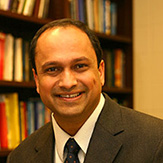Sanjeev R. Kulkarni to step down as dean of the faculty, search committee formed
Sanjeev Kulkarni, who has served as dean of the faculty at Princeton University since 2017, will step down from his position at the end of the spring 2021 term and return to the faculty.
Kulkarni’s time as dean of the faculty followed his tenure as dean of the Graduate School and caps 18 years of senior administrative service to the University. A valued member of the University’s academic community, Kulkarni will return full-time to teaching, research and student mentorship. The University will undertake an open search to fill the dean of the faculty position.
“It has been a pleasure and an honor to work with so many outstanding faculty members, academic professionals and administrators to help build the extraordinary scholarly community that we have at Princeton,” said Kulkarni, the William R. Kenan, Jr., Professor of Electrical Engineering. “I believe there is no better institution at which to be a faculty member or researcher, and I have greatly appreciated the opportunity to serve in this role.”
“I am deeply grateful to Sanjeev Kulkarni, who has served Princeton with distinction as dean of the faculty and dean of the Graduate School over the past seven years,” said Princeton President Christopher L. Eisgruber. “Sanj’s thoughtful leadership, good judgment, sterling integrity and selfless dedication to the values of this University have made Princeton a stronger institution.”
The dean of the faculty has primary responsibility for shaping the quality of the faculty as scholars and teachers, and for sustaining them in their profession. A member of the president’s cabinet and the academic planning group, the dean meets regularly with the president to discuss matters of concern to the faculty, works with the president and provost on academic initiatives, and serves as secretary to the trustees’ Academic Affairs Committee. The dean also serves as secretary of the Faculty Advisory Committee on Appointments and Advancements and the Faculty Advisory Committee on Policy, and is an ex officio member of a number of other University committees.
The search committee will be chaired by Deborah Prentice, University provost and the Alexander Stewart 1886 Professor of Psychology and Public Affairs. The other faculty members serving on the committee are: Elizabeth Gould, the Dorman T. Warren Professor of Psychology and professor of psychology and neuroscience; Bo Honoré, the Class of 1913 Professor of Political Economy and professor of economics; Tera Hunter, the Edwards Professor of American History and professor of history and African American studies; Pedro Meira Monteiro, the Arthur W. Marks ’19 Professor of Spanish and Portuguese and chair of the Department of Spanish and Portuguese; Lyman Page, the James S. McDonnell Distinguished University Professor in Physics; and Catherine Peters, professor of civil and environmental engineering, chair of the Department of Civil and Environmental Engineering, and director of the Program in Geological Engineering.
During his tenure, Kulkarni partnered with academic departments to help them sustain and build their academic excellence by improving faculty recruitment and retention, diversifying the faculty and faculty leadership, including chairs and directors, and championing faculty development and support.
Kulkarni has been actively involved with diversity efforts, including implementation of the University’s goals articulated in late summer 2020. He established a new Presidential Postdoctoral Fellowship Program and helped to lead efforts that increased the hiring of female and underrepresented minority candidates for tenured and tenure-track faculty positions.
To provide a path for progression and promotion in the lecturer ranks, Kulkarni introduced the two new ranks of “University lecturer” and “professor of the practice,” and a new committee to evaluate appointments and promotions to these ranks. These changes allow the University to recognize individuals in the lecturer ranks for their expertise, experience and important contributions to Princeton’s instructional programs.
Kulkarni collaborated with other administrative and faculty colleagues to lead the University’s recent calendar reform efforts, which brought Princeton’s academic calendar into alignment with peer institutions to facilitate learning opportunities such as visiting student and faculty exchanges, as well as study abroad and internship experiences for students. He also led the revision and improvement of a number of other policies and guidelines affecting faculty.
A member of the faculty since 1991, Kulkarni has had a distinguished career as a researcher, educator and administrator at Princeton. He served as dean of the Graduate School from 2014 to 2017, where he led the strategic planning Task Force on the Future of the Graduate School, established a position and programs for graduate student professional development, implemented a sixth-year funding program for graduate students in the humanities and social sciences, and with the dean for research implemented a program to provide research funds to faculty who support fourth- and fifth-year graduate students on sponsored research.
Previously, he was associate dean for academic affairs in the School of Engineering and Applied Science from 2003-05, head of Butler College from 2004-12, and director of the Keller Center from 2011-14.
In addition to his role in the Department of Electrical Engineering, Kulkarni is an associated faculty member in the Department of Operations Research and Financial Engineering and in the Department of Philosophy. His research interests include statistical pattern recognition, machine learning, nonparametric estimation, information theory, wireless networks, signal/image/video processing, and econometrics and finance.
“I have missed teaching and research, both of which I greatly enjoyed,” Kulkarni said. “I look forward to returning to my scholarship and to working again with students — both in and out of the classroom.”
Kulkarni holds a bachelor’s degree in electrical engineering and bachelor’s and master’s degrees in mathematics, all from Clarkson University. After completing a master’s degree in electrical engineering at Stanford University, he earned his Ph.D. in electrical engineering at the Massachusetts Institute of Technology.

